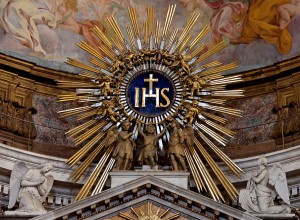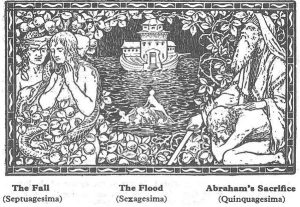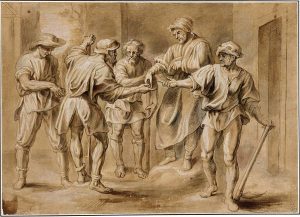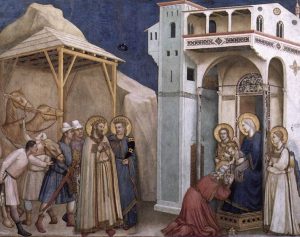 Today, is the feast of the Most Holy Name of Jesus. Historically, in 1721, Pope Innocent XIII implemented this feast of the Most Holy Name of Jesus following upon the revelation of Scripture on the Holy Name, the consistent teaching of the Magisterium, preaching of the saints, like Saint Bernard, Saint Bernardin of Siena , and Saint Ignatius of Loyola.
Today, is the feast of the Most Holy Name of Jesus. Historically, in 1721, Pope Innocent XIII implemented this feast of the Most Holy Name of Jesus following upon the revelation of Scripture on the Holy Name, the consistent teaching of the Magisterium, preaching of the saints, like Saint Bernard, Saint Bernardin of Siena , and Saint Ignatius of Loyola.
Several points in Scripture come to mind:
Zechariah 10:21: “I will strengthen them in the Lord, and they shall walk in His Name, says the Lord.”
I John 3:23: “And this is his commandment, that we should believe in the Name of his Son Jesus Christ: and love one another, as He hath given commandment unto us.”
Revelation: 3:8: “I know your works. Behold, I have given you a door opened, which no man can shut: because you have little strength, and have kept my word, and have not denied My Name.”
The Introit for the Mass today gives us the key to understanding: In the name of Jesus let every knee bow of those that are in heaven, on earth, and under the earth; and let every tongue confess that the Lord Jesus Christ is in the glory of God the Father (Phil. 2:10-11). O Lord our Lord, how wonderful is thy name in the whole earth! (Ps. 8:2).
Consider these words preached by Saint Bernard:
The sweet name of Jesus produces in us holy thoughts, fills the soul with noble sentiments, strengthens virtue, begets good works, and nourishes pure affections. All spiritual food leaves the soul dry, if it contain not that penetrating oil, the name Jesus. When you take your pen, write the name Jesus: if you write books, let the name of Jesus be contained in them, else they will possess no charm or attraction for me; you may speak, or you may reply, but if the name of Jesus sounds not from your lips, you are without unction and without charm. Jesus is honey in our mouth, light in our eyes, a flame in our heart. This name is the cure for all diseases of the soul. Are you troubled? think but of Jesus, speak but the name of Jesus, the clouds disperse, and peace descends anew from heaven. Have you fallen into sin? so that you fear death? invoke the name of Jesus, and you will soon feel life returning. No obduracy of the soul, no weakness, no coldness of heart can resist this holy name; there is no heart which will not soften and open in tears at this holy name. Are you surrounded by sorrow and danger? invoke the name of Jesus, and your fears will vanish. Never yet was human being in urgent need, and on the point of perishing, who invoked this help-giving name, and was not powerfully sustained. It was given us for the cure of all our ills; to soften the impetuosity of anger, to quench the fire of concupiscence, to conquer pride, to mitigate the pain of our wounds, to overcome the thirst of avarice, to quiet sensual passions, and the desires of low pleasures. If we call to our minds the name of Jesus, it brings before us His most meek and humble heart, and gives us a new knowledge of His most loving and tender compassion. The name of Jesus is the purest, and holiest, the noblest and most indulgent of names, the name of all blessings and of all virtues; it is the name of the God-Man, of sanctity itself. To think of Jesus is to think of the great, infinite God Who, having given us His life as an example, has also bestowed the necessary understanding, energy and assistance to enable us to follow and imitate Him, in our thoughts, inclinations, words and actions. If the name of Jesus reaches the depths of our heart, it leaves heavenly virtue there. We say, therefore, with our great master, St. Paul the Apostle: If any man love not our Lord Jesus Christ, let him be anathema (I Cor. 16:22).
Our devotional life can only be enhanced with the praying of the Litany of the Holy Name of Jesus.
The image used herewith is one you have seen in many churches, schools and retreat centers, on vestments, and other religious objects, the letters “IHS.” (Pope Francis’s coat of arms includes this seal and these letters.) These are the first three letters of Jesus’s name as it appears in Greek, the original language of the New Testament: Ἰησοῦς (Iesous.) IHΣΟΥΣ would be the capitalized form, so the iota, eta, and sigma are also capitalized in the abbreviation, the Latinate version of which is “IHS.”
 With Vespers tonight, we keenly recall in the Liturgy the extravagance of God. Sunday is Sexagesima in the Extraordinary Form–there are roughly 60 days until Easter.
With Vespers tonight, we keenly recall in the Liturgy the extravagance of God. Sunday is Sexagesima in the Extraordinary Form–there are roughly 60 days until Easter.



